UFI in St. Petersburg: Breaking down barriers
The UFI Global Congress will be coming to Saint Petersburg from 31 October to 3 November. The motto of the 85th edition is “The Dynamics of Transition - Our Industry’s Complex Future”.
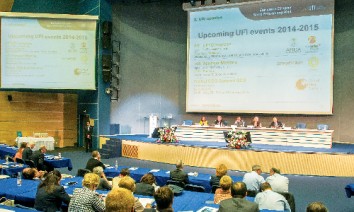
Breaking old habits can sometimes be a necessary step in our rapidly changing times. And this will be happening at the upcoming UFI congress in the five-million metropolis in north-western Russia. “Every year we work on honing the features of our event,” Kai Hattendorf tells us. “That's why there will be a few new elements again in Saint Petersburg,” announces the UFI Managing Director. There will be a panel discussion on digital transformation - a new format that is set to break down barriers. “If we invite non-industry experts, they will normally tell us what they are working on and provide some stimulating ideas,” Hattendorf describes the traditional approach. “But actually we want our external guests to get talking with people from the industry,” he explains the concept behind this year's UFI Global Congress.
The aim of the Global Association of the Exhibition Industry is to mirror global trends at its events. “What is changing right now? How fast and where is it happening?” Kai Hattendorf gets to the point. He currently sees several major trends. One of them is the further development of the Konfex concept thanks to the rampant festivalisation trend. “This is a process we are seeing worldwide,” analyses Hattendorf. “Driven by the new generation, community meeting places are emerging where the focus is rather on engaging in a dialogue than on products. "South by Southwest" in Austin, Texas, which brings together festivals, conferences and exhibitions, is an event many are trying to emulate. The fact that several trade show organisers have recently been spotted there underlines the importance of this trend. Efforts like this are to be seen elsewhere, too, the best example in Europe being Cebit. “New formats like this are a game changer in marketing. Instead of selling floor space it’s all about finding marketing-oriented solutions,” says Hattendorf. “This is flanked by reorganising and rebudgeting measures.”
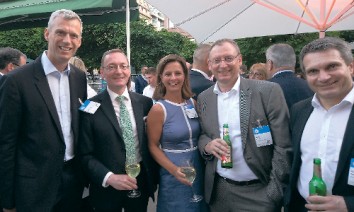
Japan), Jana Dewitz (Messe Berlin), Guido Gudat (Koelnmesse), and Markus Quint (Messe Frankfurt). (Photo: TFI)
Sustainability plays an increasingly important role in the exhibition industry, and this doesn’t stop at green events. “The term has a much broader meaning now,” says Kai Hattendorf. “Social responsibility and social aspects have become very important.” Due to the dynamic of change in the trade fair industry, it can be helpful to learn from others. A total of six “best practice” examples will be featured at the Saint Petersburg congress, twice as many as at previous events. These are the winners of the UFI Awards in five categories: digital innovation, marketing, sustainable development, operations & services and human resources (HR), plus the poster competition. One of the mentioned categories is set to become even more important for the future of the exhibition industry. Good HR strategies are decisive for the success or failure of trade fair companies and organisers: "Companies need to be attractive for employees, inspire loyalty and give them a bit of free rein," Hattendorf describes the challenges.
Especially the next generation of executives can make a significant contribution to digital development within the industry. But it is simply not enough to merely let young talents operate the boss's Twitter account. It would make more sense to adopt their way of thinking. A current UFI award-winning example from the field of “augmented reality” shows the possibilities this can open up. “In June we were sitting together at the Educational Forum for Digital Innovation,” says Kai Hattendorf. “From Hanover, we were able to follow our colleagues on a real-time tour of Suntec in Singapore.” This example shows that you don’t need to pay service providers lots of money to develop such applications - the solution in Singapore was created "hands on" by young employees who are digital natives. “This idea can boost your sales,” enthuses Hattendorf. “And it’s great for the environment because decision-makers can watch from the comfort of their own desks without having to make the trip.”
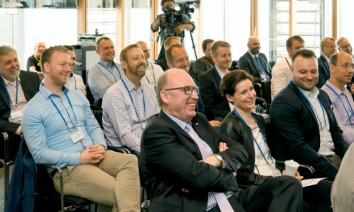
The best practice cases will be presented during the special interest group sessions. One of the sessions will be about women in the exhibition industry. It will feature discussions of female top managers who have achieved senior management positions in exhibition and congress centres or organising companies: Carina Bauer, Monica Lee-Müller and Mary Larkin. The latter was recently elected UFI President for 2020 and will be the first woman to head the association. "We discussed intensively how to further integrate the topic of women in the UFI,” reports Kai Hattendorf. The topic needs a global discourse - and this year’s congress will deliver. Finally, at the end of the Saint Petersburg congress, there will be a new talk show-like format. Industry leaders will be looking back at 2018 and making forecasts for 2019 - Chet Burchett has promised to join the panel, among others.
To ensure that all delegates can really participate in the programme, the UFI advises everybody to take care of entry formalities at an early stage. For example, EU citizens must provide proof of health insurance when applying for a visa, which takes extra time. It seems that the vast majority of delegates are heeding this advice. In July the host of the 85th UFI Congress, ExpoForum, had already sent out hundreds of invitations required for applying for a visa (www.ufi.org).
Author: Peter Borstel
This article was published in TFI issue 3/2018
“Russia is one of our Top Five”
UFI Managing Director Kai Hattendorf talks about the role of this year’s host country within the UFI.
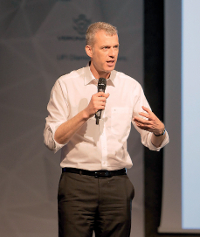
In 2005 the UFI Congress was held in Moscow. At the time the association had recruited several new Russian members. How has the cooperation with players from Russia developed within the UFI since then?
Things have been developing very well. Many personalities from Russia have occupied and still occupy senior positions within the UFI. As an example, I would like to mention Sergey Trofimov who passed away in 2016. And I would single out Sergey Alexeev, who co-launched the Global Exhibitions Days as UFI President. The figures also show the importance of the Russian trade fair industry, which is one of the Top Five for our association. We have 40 members from Russia. 115 trade fairs in the Russian Federation call themselves “UFI Approved Events”.
Where does the Russian trade show market currently stand?
Due to the sanctions and the general political climate, the past few years have not been easy. At present, the market has stabilised at a rather low level and is gradually picking up again. According to our current UFI barometer, 73 per cent of Russian trade fair companies expect sales to rise in the first half of 2019.
Will Russia also be one of the topics covered at the congress?
Last year in Johannesburg we launched a first special programme on the host country. And we will stage another one in 2018 right after the actual congress. Under the patronage of the Russian trade fair association RUEF, more than 100 professionals are expected to take part. They will be able to share market information, make new contacts and explore the options for collaborating on an international level.
Share in Facebook, Twitter or Google+:
TFI - Trade Fairs International - The International Trade Fair Magazine.
© 2006 - 2024 by TFI-Verlagsgesellschaft mbH. All rights reserved. TFI-Verlagsgesellschaft mbH shall accept no responsibility for the contents of external links and other contents.
TFI-Know-how
-
What to do when things go wrong at virtual or in-person events?

In the event world, it’s simply part of life if things don’t work out as planned.
-
How can networking be made to work at online events?

Networking typically happens at real, in-person events. But it’s also possible to do it online; it just works a little differently. There are various options available to organisers.
-
How can exhibitors stand out at trade fairs?
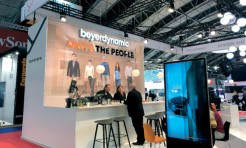
New products and a well-conceived stand design are not the only drivers for a successful presence. Many other factors are also important, but trade fair planners often lose sight of them.
-
How can industry decision-makers be reached online?
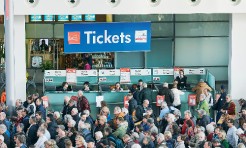
Trade fairs and trade fair companies need to constantly further develop, become more agile and flexible and offer services all year round. New, digital offerings are very important here. With its TrustedTargeting technology, Messe München offers its customers access to leading business-to-business decision-makers on the Internet.


